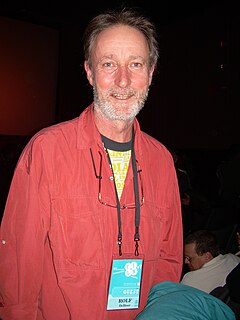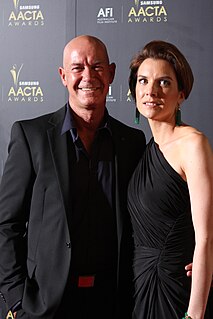
Rabbit-Proof Fence is a 2002 Australian drama film directed by Phillip Noyce based on the book Follow the Rabbit-Proof Fence by Doris Pilkington Garimara. It is loosely based on a true story concerning the author's mother Molly, as well as two other mixed-race Aboriginal girls, Daisy Kadibil and Grace, who ran away from the Moore River Native Settlement, north of Perth, Western Australia, to return to their Aboriginal families, after being placed there in 1931. The film follows the Aboriginal girls as they walk for nine weeks along 1,500 miles (2,400 km) of the Australian rabbit-proof fence to return to their community at Jigalong, while being pursued by white law enforcement authorities and an Aboriginal tracker.
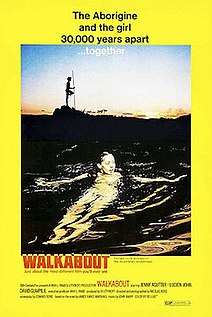
Walkabout is a 1971 British-Australian survival film directed by Nicolas Roeg and starring Jenny Agutter, Luc Roeg, and David Gulpilil. Edward Bond wrote the screenplay, which is loosely based on the 1959 novel Walkabout by James Vance Marshall. Set in the Australian outback, it centres on two white schoolchildren who are left to fend for themselves in the Australian outback and who come across a teenage Aboriginal boy who helps them to survive.
The 16th Annual Australian Recording Industry Association Music Awards were held on 15 October 2002 at the Sydney SuperDome.

The Proposition is a 2005 Australian bushranger western film directed by John Hillcoat and written by screenwriter and musician Nick Cave. It stars Guy Pearce, Ray Winstone, Emily Watson, John Hurt, Danny Huston and David Wenham. The film's production completed in 2004 and was followed by a wide 2005 release in Australia and a 2006 theatrical run in the U.S. through First Look Pictures.
Bart Willoughby is an Indigenous Australian musician, noted for his pioneering fusion of reggae with Indigenous Australian musical influences, and for his contribution to growth of Indigenous music in Australia.
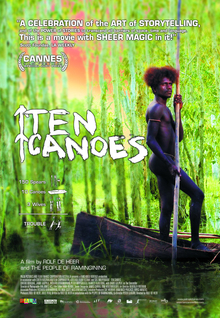
Ten Canoes is a 2006 Australian drama film directed by Rolf de Heer and Peter Djigirr and starring Crusoe Kurddal. The title of the film arose from discussions between de Heer and David Gulpilil about a photograph of ten canoeists poling across the Arafura Swamp, taken by anthropologist Donald Thomson in 1936. It is the first ever movie entirely filmed in Australian Aboriginal languages. The film is partly in colour and partly in black and white, it is in docu-drama style largely with a narrator explaining the story. The overall format is that of a moral tale.

8 Mile is a 2002 American biographical drama film written by Scott Silver, directed by Curtis Hanson, and starring Eminem, Mekhi Phifer, Brittany Murphy, Michael Shannon, and Kim Basinger. The film is based loosely on Eminem's actual upbringing, and follows white rapper B-Rabbit (Eminem) and his attempt to launch a career in a genre dominated by African-Americans. The title is derived from 8 Mile Road, the highway between the predominantly black city of Detroit and Wayne County and the predominantly White Oakland County and Macomb County suburbs. It was filmed mostly on location. 8 Mile was a critical and commercial success. Eminem won the Academy Award for Best Original Song for "Lose Yourself".
The 22nd Annual Australian Recording Industry Association Music Awards took place on 19 October 2008. The nominees for all categories were announced on 10 September, while the winners of the Artisan Awards were announced on the same day.
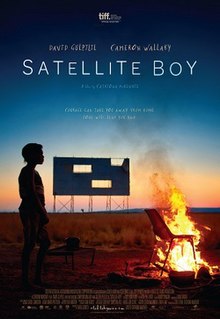
Satellite Boy is a 2012 Australian film about a young Aboriginal boy struggling to maintain the traditions of his heritage in the modern world when a mining company expands into the region. Written and directed by Catriona McKenzie, the film premiered domestically on 10 December 2012 at the Perth International Arts Festival, two days after being released at the Toronto International Film Festival.

Charlie's Country is a 2013 Australian drama film directed by Rolf de Heer. It was selected to compete in the Un Certain Regard section at the 2014 Cannes Film Festival where David Gulpilil won the award for Best Actor. It was also screened in the Contemporary World Cinema section at the 2014 Toronto International Film Festival and awarded the Best Fiction Prize and the Youth Jury Prize at the 2015 International Film Festival and Forum on Human Rights (FIFDH) in Geneva.

Sweet Country is a 2017 Australian western film directed by Warwick Thornton. It is set in 1929 in the outback of the Northern Territory, Australia. It was screened in the main competition section of the 74th Venice International Film Festival and in the Platform section at the 2017 Toronto International Film Festival. At Venice, it won the Special Jury Prize award, and at TIFF it won the Platform Prize. It also won Best Feature Film at the 2017 Asia Pacific Screen Awards.
Graham Tardif is an Australian composer.
John Clifford White is an Australian composer. His film credits include Romper Stomper. The Heartbreak Kid, Metal Skin, and Macbeth.

"Took the Children Away" is a song written and recorded by Australian singer Archie Roach. The song was released in September 1990 as his debut single. The song was included on Roach's debut studio album Charcoal Lane.

Sensual Being is the fourth studio album by Australian singer songwriter Archie Roach. The album was released in July 2002 and peaked at number 59 on the ARIA Charts.

1988 is a compilation album by Australian singer song writer Archie Roach.
